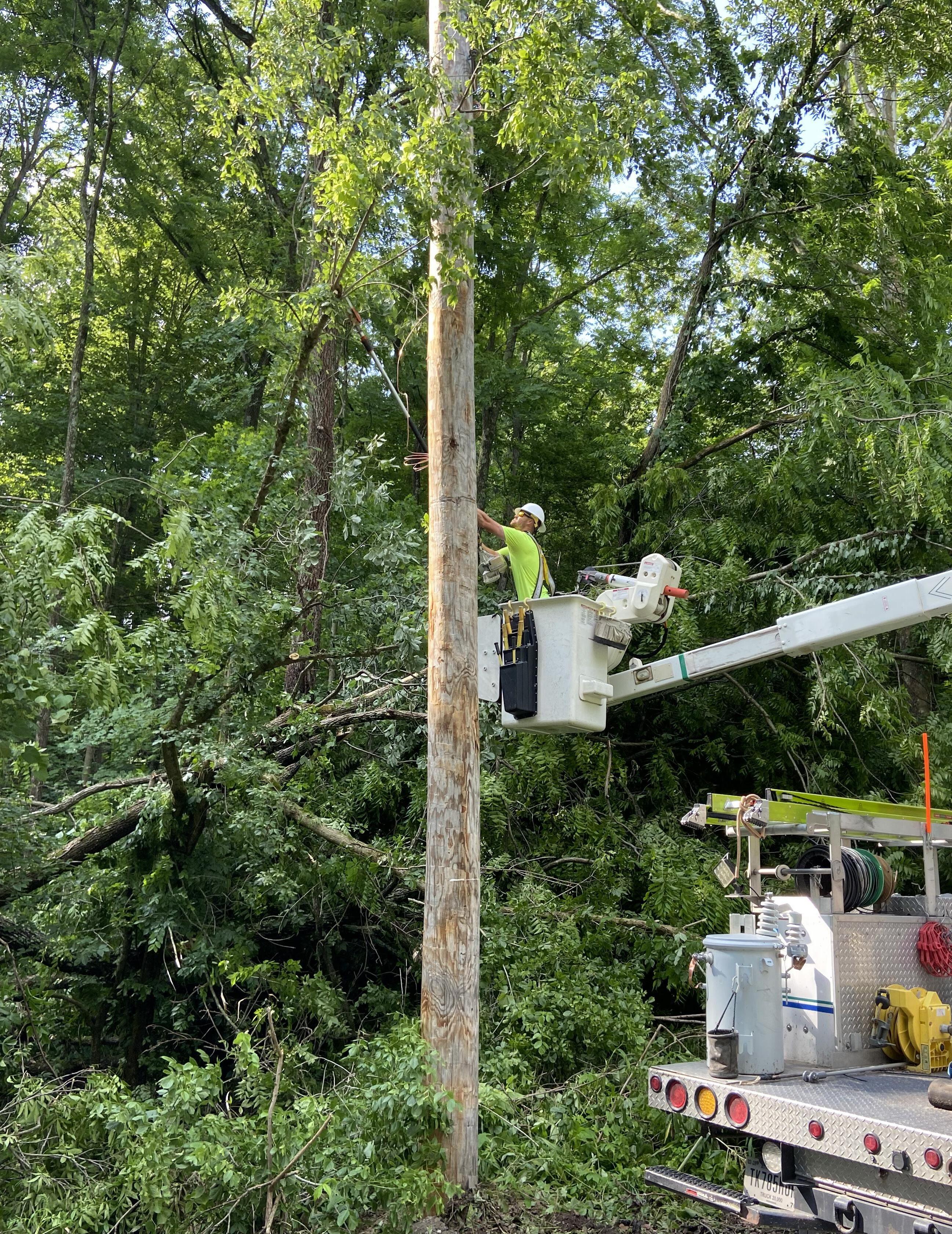




2
3 Clearing the Path to Reliability
4-5 Be Prepared for Spring Storms
6 Diverse Fuels
7 Quick Links
8 Mini-Member Puzzle
Contact Us: 765-544-2600
Report an Outage: 800-284-3452
(USPS 171-360 Published Monthly)
Contributors:
Cathy Rhoades and David Toll
Publication Office:
2777 S. 840 W.
Manilla, IN 46150
Periodical Postage paid in Indianapolis, Indiana 46206
POSTMASTER:
Send address changes to:
ELECTRAWATT
P.O. Box 55, Manilla, IN 46150
2

Spring is an optimal time of year to dream up and achieve your landscaping masterpiece. Perhaps you're planning to build a new deck to enjoy on spring evenings. If any of your spring projects require digging - such as planting trees or shrubs or setting posts - remember to dial 811 first.
Underground utilities such as buried gas, water and electric lines, can be a shovel thrust away from turning a spring project into a disaster.
Play it safe by dialing 811 to find out where utility lines run on your property. Your call will be routed to a local "one call" center. Tell the operator where you're planning to dig and what type of work you will be doing, and affected local utilities will be notified.
In a few days, a locator will arrive to designate the approximate location of any underground lines, pipes and cables. These areas will be marked with flags or paint, so you'll know what's below. Then the safe digging can begin.
Although may homeowners tackling do-it-yourself digging projects are aware of "Call Before You Dig" services, the majority do not take advantage of the service. A national survey showed that only 50% of homeowners called to have their lines marked before starting digging projects, according to the Common Ground Alliance (CGA), a federally mandated group of underground utility and damage prevention industry professionals. CGA data also shows that an underground utility line is damaged every six minutes in the U.S. because someone decided to dig without first dialing 811.
Even simple tasks like installing a new mailbox post can damage utility lines, which can disrupt service to an entire neighborhood, harm diggers and potentially result in fines and repairs.
Never assume the location or depth of underground lines. There's no need: the 811 service is free, prevents the inconvenience of having utilities interrupted and can help you avoid serious injury. For more information about local services, visit www.call811.com.

Trees are majestic, beautiful and good for the soul. But we also know that our members depend on us to deliver reliable power to their homes and businesses. That's why RushShelby Energy strives to balance maintaining the beautiful surroundings we all cherish with ensuring reliable electricity. You might not realize it, but there are several benefits to regular tree trimming.
Reliability
Keeping power lines clear of overgrown vegetation improves service reliability. After all, we've seen the whims of Mother Nature during severe weather events with fallen tree limbs taking down power lines and utility poles. While many factors can impact power disruptions, about half of all outages can be attributed to overgrown vegetation. This is why you sometimes see RushShelby Energy crews or contractors out in the community trimming trees near power lines. Our trimming crews have been trained and certified based on the latest industry standards.
In fact, all U.S. electric utilities are required to trim trees that grow to close to power lines. Scheduled trimming throughout the year keeps lines clear from overgrown or dead limbs that are likely to fall, and we are better able to prepare for severe weather events.
Plus, we all know it's more cost-effective to undertake preventative maintenance than it is make repairs after the fact. Drone inspections of power lines and vegetation allows us to reduce labor and equipment costs while bolstering reliability. Through the use of small drones, we can accurately monitor the health and growth of trees and identify potential problems.
Safety
Working near power lines can be dangerous, and we care about your safety and that of our linemen. For example, if trees are touching power lines in our members' yards, they can pose a grave danger to families. If children can reach those trees, they can potentially climb into a danger zone. Electricity can arc, or jump, from a power line to a nearby conductor such as a tree.
Any tree or branch that falls across a power line creates a potentially dangerous situation. A proactive approach lessens the chances of fallen trees during severe weather events that make it more complicated and dangerous for linemen to restore power.
Affordability
As a co-op, RushShelby Energy always strives to keep costs down for our members. If trees and other vegetation are left unchecked, they can become overgrown and expensive to correct. A strategic vegetation management program helps keep costs down for everyone.
When it comes to vegetation management, there are ways you can help too. When planting new trees, make sure they're planted a safe distance from overhead power lines. Medium-height trees (40' or smaller) should be planted at least 25' from power lines. Taller trees (over 40') should be planted at least 50' from power lines. You can also practice safe planting near pad-mounted transformers. Plant shrubs at least 10' from the transformer door and 4' from the sides. If your neighborhood has underground lines, remember to contact 811 before you can begin any project that requires digging.
Additionally, if you spot an overgrown tree or branch that's dangerously close to overhead lines, please contact Justin Walton at 765-544-2965.
We have deep roots in our community, and we love our beautiful surroundings. It takes a balanced approach, and our vegetation management program is a crucial tool in ensuring service reliability.

Spring is a fickle season that brings nature's renewal of buds and blooms to the trees and fields and also brings dark, powerful rolling storms that can wreak havoc.
Weather disasters can occur year-round, but most of the worst storms Indiana receives come in the spring.
Here are some tips from RSE for staying safe before and after a storm hits.
• Make sure your cell phone is charged. Consider purchasing an external battery charger to charge your phone.
• Have a battery-operated radio available so you can stay updated on the latest weather watches and warning.
• Unplug appliances and other electrical items, such as computers. Damage can occur from power surges caused by nearby lightning strikes.
• Have an emergency kit ready and create a family communication plan.
• If you are driving and come upon fallen power lines, turn around. Never drive over or around fallen lines.
• If a downed power line falls on your vehicle, stay in the vehicle. Call 911. Exit only if your life is in immediate danger from fire or other reasons. Then, jump clear of your vehicle being certain to never touch the vehicle and the ground at the same time; then shuffle away keeping your feet together at all times.
• While checking for damage outside your home, be aware of hazards from exposed nails, broken glass and broken tree branches dangling on other limbs.
• To avoid the chance of a fire or explosion, use a flashlight, instead of a candle or torch, to inspect your home in the dark.
• Since downed power lines could still be energized, do not touch them or any objects in contact with them. Call 911 to report the downed lines.
When the spring storms arrive, know how to keep yourself, your family and your property safe from harm during a severe storm.
• Wear proper safety material. As you are cleaning, wear proper protection to prevent injury. Work gloves, safety glasses, heavy-duty work shirt with long sleeves, work pants and steel-toe boots are a good idea if you are clearing large amounts of broken, splintered or sharp debris.
• Stay away from power lines. Always assume a downed power line is live. Downed power lines pose a particularly dangerous threat in areas where individuals are clearing fallen trees and branches from roads and lawns. Let the professionals handle this job. It's not worth the risk. If you see a downed power line that is sparking or on fire, call your electric utility immediately.
• Stay away from damaged buildings or structures. If a building has been subjected to flood waters or high winds, it may not be structurally safe. It's best to stay away from these types of structures until professionals can assess the extent of the damage.
• Never operate gasoline-powered equipment indoors. Gas engines emit carbon monoxide - an odorless, colorless and poisonous gas you should never breathe.
Are you prepared when a storm hits? Here are some helpful tips to keep you, your loved ones and your property safe.
• Have an emergency kit ready and create a family communication plan before a storm hits.
• Program the outage number, 800-284-3452 into your cell phone or text "Outage" to 55050. This will make it easier to report a power outage.
• Plumbing and bathroom fixtures can conduct electricity. Use with caution.
• If you notice frayed wiring or sparks, or smell a burning odor, shut off the electrical system at the main circuit breaker immediately.
• Know how to properly use a portable generators if you lose power during the storm.


The winningest basketball teams in history are ones that are consistent and have players with varying abilities. Some are better at shooting three-pointers, some are best at defense. Having a balanced mix of skills makes the team a powerhouse on the court. The way to keep electricity reliable is a bit like that too.
The power team first requires a foundation of consistent sources that can be put in the game any time they're needed. Having enough "always available" fuel sources like natural gas and coal and ensure consistent power generation.
Just like a team needs different players for different situations, our power grid requires multiple sources to keep the grid running. Relying solely on one player to win every game is not an effective strategy - if they get injured, you'll likely lose. Similarly, using a single fuel source for electricity generation poses a significant risk to energy reliability. Natural disasters, geopolitical tensions or unforeseen disruptions can severely impact the supply chain of a particular fuel. A diverse mix of energy sources acts as a safeguard, ensuring that the grid remains operational even in the face of unexpected challenges.
A diverse energy mix also enhances grid flexibility by accommodating the intermittent nature of renewable energy sources like solar and wind. Think of solar power like a team's inconsistent three-point shooter. It's awesome when the sun is shining bright, but what if it's nighttime or cloudy day? That's where the other players, like wind, hydro, nuclear, natural gas and coal can step up and keep the team scoring.
Diverse fuel sources contribute to the stability and reliability of the electric grid. The different sources have varying characteristics, including generation patterns, responsiveness and storage capabilities. This diversity allows for a more balanced and resilient energy system that can adapt to fluctuating demand and unforeseen circumstances. Having a mix of these energy sources is like having a team with different skills to handle various situations and scenarios.
A diverse set of energy sources is essential, but that's not the only thing we need to have reliable electricity - or a winning team. Basketball teams are always trying out new plays or training rookies to create a versatile lineup. Similarly, electric cooperatives are constantly innovating to maintain reliability for tomorrow. But creating new ways to make our power sources more efficient and reliable takes time, money and advances in technology that aren't necessarily ready yet.
As we continue to work on the innovations of tomorrow, the key to keeping our electricity reliable right now is ensuring a diverse "team" of fuels. Each one brings something special to the table, and together, they make sure we have the power we need, whenever we need it.

Your photo could be selected to be the cover of the 2025 RushShelby Energy Planner and win a $250 bill credit.
Terms & Conditions:
• Must be an RSE member
• The photo must be electrical-related
• Please make sure photos are a high resolution. Enter as many photos as you would like
• Send photos to crhoades@rse.coop
• Must be original work, taken by the entrant
• Deadline to enter is September 1, 2024
Students graduating from high school this May can apply for a $1,000 scholarship from RushShelby Energy. Two scholarships will be awarded.
Students must be the child of a RushShelby Energy member, residing in a home served by RSE electricity. Applications will be judged on scholarship, citizenship and school activities. Each application must also include a 750-to-1,500 word essay. All scholarship requirements and essay information can be found on our website at www.rse.coop. The deadline to apply is April 9, 2024.

Lengthen the life of your clothes dryer with regular cleaning. Clean the lint filter after every load, which improves air circulation and safety. Check the lint trap opening to ensure it's clean. Use a vacuum to remove any lint that's fallen inside the opening. If you use dryer sheets, check the lint filter for residue buildup. Remove any residue with hot water and a nylon brush or toothbrush. Over time, dryer sheets can leave a film on the filter, which can affect the performance of the motor.

Spring is a wonderful season, but it can bring powerful storms. Read the clues, then use the word bank to complete the storm safety tips.


1. Keep a ________________handy in case of a power outage.
2. Be watchful for signs of a thunderstorm, including dark skies, flashes of ____________or strong winds.
3. If a ______________is issued, seek shelter in a centrally-located room in your home, a basement or storm cellar.
4. If you're outside and hear_________ go indoors immediately.
5. Practice a tornado ________ with your family once a year.
Word Bank
• thunder
• drill
• flashlight
• tornado warning • lightning